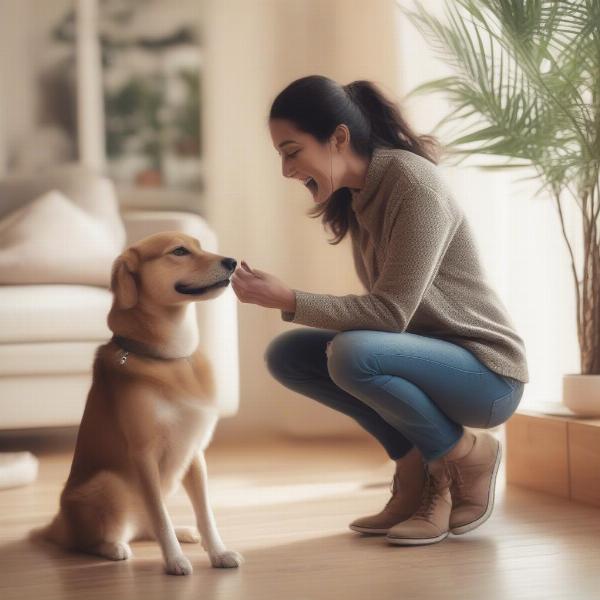The search term “gayest dog” can be interpreted in a few ways. While some might be looking for flamboyant or stereotypical representations, often fueled by humorous internet trends, it’s crucial to remember that sexuality doesn’t apply to dogs in the same way it does to humans. This article will explore the possible intentions behind this search term, addressing the potential for anthropomorphism while focusing on celebrating the unique personalities and characteristics that make every dog special. We’ll delve into how certain breeds or behaviors might be perceived, discuss the importance of avoiding harmful stereotypes, and ultimately focus on appreciating the individuality of our canine companions.
While there’s no scientific basis for a “gayest dog,” some people might associate certain breeds or behaviors with the term, often based on playful stereotypes. Perhaps a dog with a particularly sassy strut or a penchant for dramatic displays of affection might be jokingly labeled as such. It’s important to recognize this for what it is – lighthearted fun – and avoid projecting human concepts of sexuality onto our pets. Instead, let’s focus on celebrating the unique quirks that make each dog an individual.
Is There Really a “Gayest Dog Breed”?
The idea of a “gayest dog breed” is a misconception. There’s no scientific evidence to support this notion. Any perceived connection between breed and sexuality is purely based on human interpretation of dog behavior and physical characteristics. Each breed has its own unique temperament and behavioral traits, but these have nothing to do with sexual orientation.
Avoiding Harmful Stereotypes
It’s crucial to avoid perpetuating harmful stereotypes when discussing our furry friends. Labeling a dog as “gay” based on superficial observations can reinforce inaccurate and potentially damaging assumptions about both dogs and the LGBTQ+ community. Let’s appreciate our dogs for who they are, regardless of how they express their natural canine behaviors.
Celebrating Individuality in Dogs
Just like humans, every dog has its own distinct personality. Some are playful and energetic, while others are more reserved and cuddly. Some might enjoy boisterous games of fetch, while others prefer quiet snuggles on the couch. These individual differences are what make our canine companions so special and enriching to our lives.
How to Appreciate Your Dog’s Unique Personality
Understanding your dog’s individual personality is key to building a strong and loving bond. Observe their behavior, learn their preferences, and respect their boundaries. Provide them with the appropriate environment, enrichment, and training to help them thrive and express their true selves.
What are some common misconceptions about dog behavior?
Many people misinterpret common dog behaviors, often attributing human emotions or motivations to their actions. For example, a dog wagging its tail isn’t always happy; it can also be a sign of anxiety or aggression. It’s important to learn about canine body language and communication to accurately understand your dog’s feelings.
How can I provide the best care for my dog, regardless of its perceived personality?
The best way to care for your dog is to focus on their individual needs. This includes providing a balanced diet, regular exercise, mental stimulation, and a safe and loving environment. Regular veterinary checkups are also essential for maintaining their physical health.
Conclusion
The search for the “gayest dog” often stems from humorous intent but highlights the importance of avoiding anthropomorphism. While we might jokingly attribute human characteristics to our pets, it’s crucial to remember that dogs experience the world differently. Let’s celebrate the individuality of each dog, appreciating their unique quirks and personalities without resorting to labels or stereotypes.
FAQ
- Does a dog’s breed determine its personality? While breed can influence certain behavioral tendencies, each dog is an individual, and their personality is shaped by a combination of genetics, environment, and experiences.
- How can I tell if my dog is happy? Look for signs like a relaxed body posture, a soft, slightly open mouth, and a gentle wagging tail. However, it’s crucial to consider the entire context of the situation.
- Is it harmful to joke about a dog’s sexuality? While lighthearted humor can be harmless, it’s important to avoid perpetuating stereotypes or projecting human concepts onto animals. Focus on appreciating your dog’s individuality instead.
- What’s the best way to celebrate my dog’s unique personality? Provide them with the environment, enrichment, and training that suits their individual needs and preferences.
- Where can I learn more about dog behavior and communication? Consult reputable sources like certified dog trainers, veterinary behaviorists, and reputable online resources.
 Understanding Dog Behavior and Communication
Understanding Dog Behavior and Communication
About ILM Dog
ILM Dog (ilmdog.com) is your premier resource for expert advice on all aspects of dog care and companionship. From breed selection and training to health, nutrition, and grooming, we provide practical, reliable information for dog owners worldwide. Our team of experienced writers and dog enthusiasts is dedicated to helping you navigate the joys and challenges of dog ownership. Whether you’re a seasoned dog parent or just starting your journey, ILM Dog is here to support you every step of the way. For personalized guidance and expert advice, contact us at [email protected] or call us at +44 20-3965-8624.